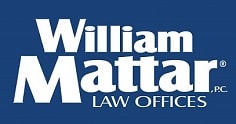What Is the Minimum Auto Insurance Coverage in New York?
Car accidents are capable of not only doing serious damage to your body and vehicle, they can also have a profound impact on your financial future. In fact, the expenses associated with car accidents can be overwhelming.
At William Mattar Law Offices, we want to help you move forward with your life as soon as possible after a car accident. If you suffered a serious injury, it’s important that you contact us immediately, so we can begin gathering important evidence. Call us 24 hours a day.
Types of Car Insurance Coverage
A simple review of your car insurance policy can help ensure you are protected from the costs of an accident that’s not your fault. With many different levels of coverage available in New York State, it’s vital to understand the coverage offered by a state minimum policy.
- Liability Coverage
If a claim for damages—or compensation for a loss and/or injury due to negligence—is brought against you, your liability coverage can protect you. Your insurance company has a duty to defend you and can pay the party that filed a valid claim up to your coverage levels—so you don’t have to pay out of pocket. - Property Damage
This important coverage can safeguard you in the event that your vehicle causes damage to someone else’s property. Carrying enough property damage insurance can protect you from the big expense of replacing or repairing another person’s property and also from having your personal assets seized in a lawsuit. - Uninsured Motorist Coverage (UM)
UM coverage can protect you in the event that you are involved in a hit-and-run accident or a wreck with an uninsured negligent motorist. This type of coverage can be used to cover bodily injuries if the uninsured driver is unable to pay. New York State requires that insurance carriers provide UM coverage. - No-Fault Insurance (Personal Injury Protection)
No-Fault insurance, sometimes called personal injury protection or PIP, is insurance coverage that can cover medical treatment, lost wages, and other costs for occupants of the insured vehicle regardless of who caused the accident.
The No-Fault insurance claim is separate from the liability claim, even though the same insurance company may be involved or make a payment. Certain circumstances—such as if you were operating your vehicle while intoxicated—will disqualify you from this coverage.
State Liability Insurance Minimums
New York State law requires that you carry minimum levels of liability insurance with your policy. Additional coverage is available with an increased policy premium. Check your insurance policy’s Declarations Page to verify your current level of coverage.
- Bodily Injury Coverage
You must carry a minimum of:
$25,000 per person injured in an accident/$50,000 for all persons injured in an accident. - Death Benefits
You must carry a minimum of:
$50,000 per person killed in an accident/$100,000 for all persons killed in an accident. - Property Damage
You must carry a minimum of:
$10,000 for injury or destruction of property caused by one accident.
Review Your Policy Today
We’re dedicated to helping people throughout New York State get the compensation they deserve for their accidents—don’t wait until an accident to review your car insurance coverage.
The car accident and injury lawyers at William Mattar Law Offices can help you understand the types of coverage available to you and try to answer any questions you may have about your car insurance policy. Call our office at (844) 444-4444 or fill out our free initial consultation form.
For most people, we believe that the state liability insurance minimum limits are too low. Speak with your insurance agent about the coverage that’s right for you.

















